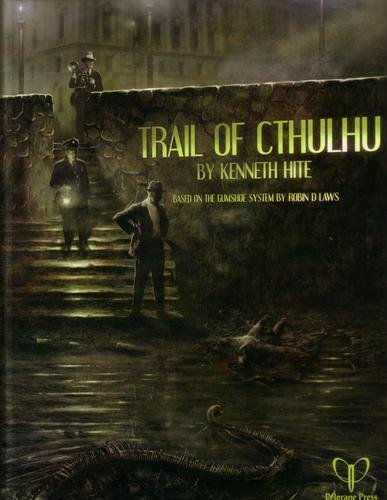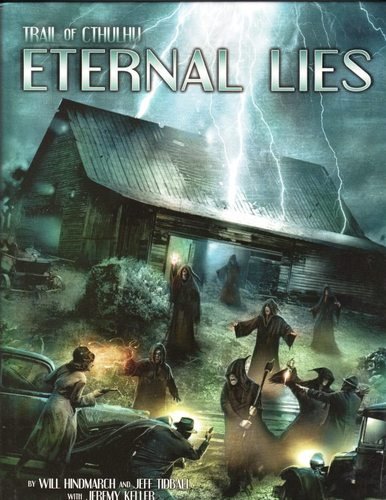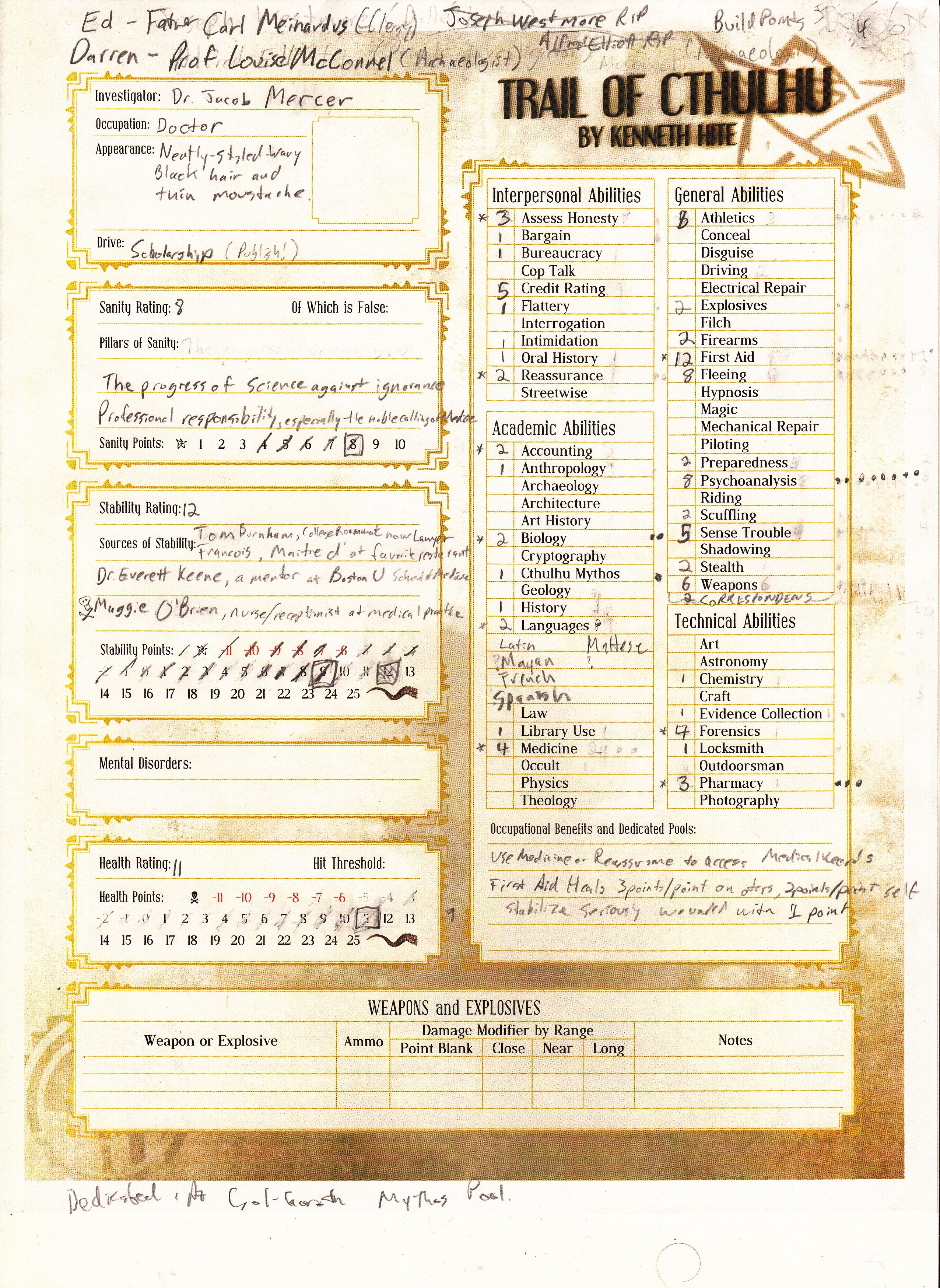A while back I played in an online game of Trail of Cthulhu over a number of sessions, playing through the Eternal Lies adventure. I had never done any Cthulhu gaming before, although I had picked up an idea of what it was about through geek osmosis, and I had also read quite a few of Lovecraft's original stories over one summer vacation when I was in college.
(image from RPGGeek)

Trail of Cthulhu uses the GUMSHOE system, so your character has two sets of stats: your “investigative” abilities like Accounting, Forensics, or Theology, and your “general” abilities like Driving, Firearms, or Sense Trouble. Your investigative abilities are what determines whether you get information about the mystery of the adventure: if you think a company is really a front operation for some kind of cult, have somebody with the Accounting skill get a look at their books and they'll likely be able to figure out something about that. Furthermore, in some situations you can spend your points in those abilities to get extra information about the subject, when you really delve into it. The general abilities are usually for conflicts or other interactions, things like chases, fistfights, gunfights, tailing somebody without getting noticed, etc. They also have spendable points that feed into a rather unforgiving dice mechanic, so it's sort of like a resource management / how-far-are-you-willing-to-push-it element to the game.
(image from RPGGeek)

The basic premise of the Eternal Lies adventure is that a previous team of Mythos Investigators failed in one of their missions, and the daughter of the now-deceased leader gathers the PCs to figure out what happened, which leads them on a journey around the globe to put the pieces together and fight the threat that may finally be coming due.
Let me tell you about my character
My character was Dr. Jacob Mercer, a medical doctor from Boston with a fascination for strange cases, which he also likes to leverage for notoriety for himself when he writes them up for medical journals. At first I didn't have a strong idea for his personality other than that he was a middle-class striver who was interested in moving up in the world, but maybe a little bit odd because of his potentially unsavory interest in medical oddities. I factored that in when creating his sources of stability, rather than being married as would be typical for someone in his place in society I decided that he was single and one of his “Sources of Stability” (NPCs that you interact with that help keep you grounded) was that maitre d' at the French restaurant in Boston where he eats many of his meals. In the early part of the investigation you find [minor spoilers] some photographs of a cult engaging in a rather extreme drug-fueled orgy. The game called for a minor Stability check when looking at them (the stat that determines how well you can handle stress) and the other players succeeded at their rolls while I failed at mine, which helped inform my portrayal going forward: I played it like he didn't realize other people weren't as shocked by the depravity as he was. I played him as something of a neophyte to the occult and Mythos stuff, and as he learned more about the situation in the adventure he mostly tried to view it as a public health crisis: the Mythos entity was a cancer that was infecting people and the planet itself and it needed to be stopped. Over the course of the adventure I got really attached to my plucky doctor, as he managed to get out of a lot of nearly-deadly scrapes and make some real progress at shutting down the evil cults, although the stresses of being exposed to the crazy world of the Mythos did take their toll on him.

My thoughts about the gameplay
My attitude toward the GUMSHOE system is that it's a complete and functional game. As bland as that description sounds, I wouldn't say that about all published games! There's really two interlinked systems in the game, the investigative aspect and the “doing stuff” aspect. Basically, the investigative aspect is there to provide colorful details and point you to one or more interesting places to go whenever you poke around somewhere interesting, and the other system covers getting into those interesting places or interacting with bad guys. Your investigative skills let you show off (to at least a minor degree) who your character is: I'm the type of guy that would go see if he can observe the autopsy of that mysteriously-murdered person (and since I have the appropriate skill the GM will use that to feed me the appropriate information that can give me a lead on something else to investigate). That's not the most high-impact contribution from characterization I've ever encountered in a game, but it's also not nothing.
The “general abilities” system is mostly a 1d6 system task resolution mechanic where you need to beat a difficulty number, usually a 4. Since those aren't great odds the meat of the system is mostly in when and how you spend your points to get bonuses to your roll. If you marshal them appropriately (and have good luck with the dice) you can be very effective in the action scenes, if you squander them unnecessarily you'll find yourself facing serious problems without the ability to boost your way to success. Despite the simplicity I actually found this to be pretty engaging, the fights especially were more tense and interesting than I expected them to be because the tension tends to increase as you drain your pool and get closer and closer to do-or-die territory.
This pattern of two interlocked systems which both have elements of meaningful contribution seems to tick all the boxes for what you'd need in a complete and functional game. It doesn't do too much more than that, there's not much intricacy in any of the susbsystems to get absorbed in, and the impact from the difference in character abilities isn't too deep (the chargen rules are set up to make sure all your bases are covered in terms of having at least one character with each investigative skill, although during play I would sometimes get a little aggravated when other players weren't doing things that their skills would enable them to do, such as the guy with Cop Talk never seeming to be interested in reading police reports), but it gets the job done. Basically, the game gives you kind of a baseline level of fun and then you get a bit more out of it from the roleplaying and characterization in the moment, such as what you say in dialog with the NPCs, how you react to the weird and horrifying situations, etc.
My thoughts on the adventure
I'll try to avoid any major spoilers for Eternal Lies. Structurally, the adventure reminded me of a video game where there's an opening section, and then four “nodes” that you can deal with in any order, and then a final resolution. Some aspects were a bit interesting, I thought the initial situation in Los Angeles was the most compelling. The different locations around the globe were a bit hit-or-miss. There's a section where you have to get to the place where the final showdown takes place that's very difficult to succeed at (unlike the other players my character had managed to survive every encounter and had been racking up XP since the beginning of the game rather than needing to swap in new characters, but even that wasn't enough). Rather than letting that failure end the story at that almost-resolved state the GM suggested we just kind of gloss over the total-party-kill and move on to the actual end of the story to resolve things, and that part was satisfying. (One of my last actions of the game was to do the classic “I slap him across the face and say, 'pull yourself together, man!'” to an NPC who was freaking out but whose help we needed.)
Overall I found the “mystery” of the adventure a bit aggravating – it develops during the course of the investigation that some of the things the cultists believe about the entity they're worshiping may involve false, misleading, or conflicting information about its true nature. This made it kind of tough to develop any kind of “theory of the case” since it was unclear what we could rely on. Normally I think of cultists as being sincere (if secretive) about their beliefs, but with deception (and possibly multiple layers of deception) in the mix it got somewhat mushy. From discussing things after it was finished I got the impression that the adventure might have been geared more toward playing the characters like old hands at Mythos investigations, trying to figure out which Mythos entities were involved rather than treating it like a fresh “something weird is going on, go figure out what,” which is how I was playing it.
Overall thoughts
I don't have a burning passion to play Trail of Cthulhu since it doesn't have a lot of features that tend to grab my personal attention, but if someone I knew was enthusiastic about it and wanted to put a group together I'd certainly be willing to participate, the game seems like it would be solid fun most of the time. If I were GMing I doubt I'd want to run this adventure, due to some of my frustrations with the structure of the Mythos mystery (and since I already know all the spoilers I can't imagine ever being a player in it again, but that's kind of par for the course with a mystery-based adventure). But since this is the only Trail of Cthulhu adventure I've ever experienced I don't really have any idea how it rates relative to others.
Another excellent perspective! The only GUMSHOE game I've ever played in was Night's Black Agents, a game which came to a halt due to the unforgiving nature of the "general abilities" system you describe. The characters were supposed to be these badass vampire-hunting James Bond-tier espionage experts, but having to expend limited resources to succeed at individual rolls in extended conflicts made us feel much more fragile than the genre conceits would suggest.
It's unusual to hear a GUMSHOE recap or teardown that doesn't reference the system's supposed big innovation, which is the "you always succeed at getting the clue needed to advance the plot" rule. Perhaps with your breadth of gaming experience, that sort of "don't roll to stop the game" admonition goes without saying! It's also interesting to hear, given that context, that there was a plot-stopping failure in your adventure--I guess if moving forward hinges on a General skill or conflict rather than an Investigation, all bets are off.
Downvoting a post can decrease pending rewards and make it less visible. Common reasons:
Submit
I played a bit of Night's Black Agents too, but our campaign ran aground on scheduling issues and then the group sort of dissolving. My character was still feeling somewhat hypercompetent when it happened, but we had only started running into supernatural opposition at the time so I don't know what the later game is like. I was a bit disappointed that game never continued because I had been wanting to play a character who was really into guns since I watched the reality TV show Top Shot and that was the perfect opportunity. It fizzled before I even got a chance to use the shotgun I spent character points for specialized training in.
Downvoting a post can decrease pending rewards and make it less visible. Common reasons:
Submit
Thanks for your explanation and your opinion, it was actually really useful to me.
I've been playing Call of Cthulhu for a while now (7th ed.) and I've been wondering about other games with the same setting, specifically this one (which should be somewhat similar to CoC) and "Alba di Cthulhu" (Dawn of Cthulhu), a game by the authors of Sine Requie. Anyway, I might just give this one a try...when we've finished our current, very long campaign in CoC :D
Downvoting a post can decrease pending rewards and make it less visible. Common reasons:
Submit
@danmaruschak .....its a great privilege knowing about this wonderful game "Trail of cthulhu"
With your description of the game play, the adventure and the characters i find it really great and fun
Well i guess i may have to give this a trial.... Thanks to bringing up this wonderful post
Downvoting a post can decrease pending rewards and make it less visible. Common reasons:
Submit